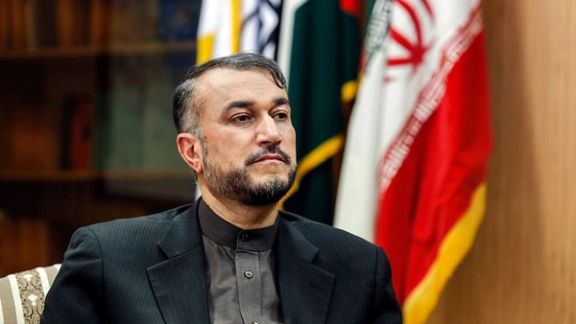Vienna Talks: Iran Foreign Minister Insists On ‘Economic Guarantees’

Despite participants tweeting guarded optimism over the looming renewal of the 2015 Iran nuclear deal, sticking-points remained Friday.

Despite participants tweeting guarded optimism over the looming renewal of the 2015 Iran nuclear deal, sticking-points remained Friday.
On Friday morning the lead British negotiator, Stephanie Al-Qaq, tweeted with the hashtag #EndgameViennaTalks that the ‘E3’ (France, Britain, and Germany) were meeting to take stock. In another tweet Al-Qaq wrote that a deal was "possible…but not guaranteed” and needed to be reached “before the diplomatic window closes.”
Fars news agency tweeted Friday a statement from Hossein Amir-Abdollahian, Iranian foreign minister, that the “haste of the western side cannot prevent the need to protect Iran’s red lines” even though Iran was “ready for a good agreement.” Amir-Abdollahian said that foreign ministers would not be able to gather in Vienna, for a signing ceremony, unless Iran was given “effective economic guarantees.”
Iran has sought in the talks guarantees both that the United States would not again leave the 2015 deal, as it did in 2018, and that parties to the deal would take other measures – including sanctions levied on other grounds, including ‘terrorism’ – ‘interfering’ with Iran’s ability to access overseas markets and attract inward investment.
Premature good news?
"Premature good news does not substitute good agreement,” Iran Foreign Ministry Spokesman Saeed Khatibzadeh tweeted Thursday evening.“Nobody can say the deal is done, until all the outstanding remaining issues are resolved. Extra efforts needed…Everybody is now focused on the final critical steps.”
"We are close to a possible deal," Jalina Porter, a US State Department's spokesperson, told a press briefing Thursday evening. "If Iran shows seriousness, we can and should reach an understanding on mutual return to full implementation of the JCPOA within days." Having left the 2015 nuclear deal, the JCPOA (Joint Comprehensive Plan of Action) and imposed ‘maximum pressure’ sanctions in 2018, prompting Iran to expand its nuclear program after 2019, the US takes part in Vienna indirectly.
‘Not there yet’
Enrique Mora, the European Union official chairing the talks tweeted Thursdaythat the talks, while in their "final stages", still faced challenges: "Some relevant issues are still open and success is never guaranteed in such a complex negotiation. Doing our best in the coordinator's team. But we are definitely not there yet."
Mikhail Ulyanov, the lead Russian negotiator in the talks, said Thursday evening said he had met with Iran's top negotiator Ali Bagheri Kani to discuss steps "to finalize" the talks.
Oil analysts say international markets are expecting more Iranian oil to flow into the market with an agreement in Vienna to restore the JCPOA and lift the sanctions. With the Ukraine crisis oil prices have soared to unprecedented heights of above $115 per barrel in a decade. While Russia's oil and gas exports have not been sanctioned, Iran has around 100 million barrels of oil in storage.
Under a restored JCPOA, Iran would severely cut back stocks of enriched uranium. The latest report from the International Atomic Energy Agency (IAEA) showed Iran had 33.2 kg (110 pounds) of uranium enriched to 60 percent. The Reuters news agency cited a “senior diplomat” that this was around three-quarters of the amount needed, assuming it was further enriched to 90 percent, for a nuclear bomb.